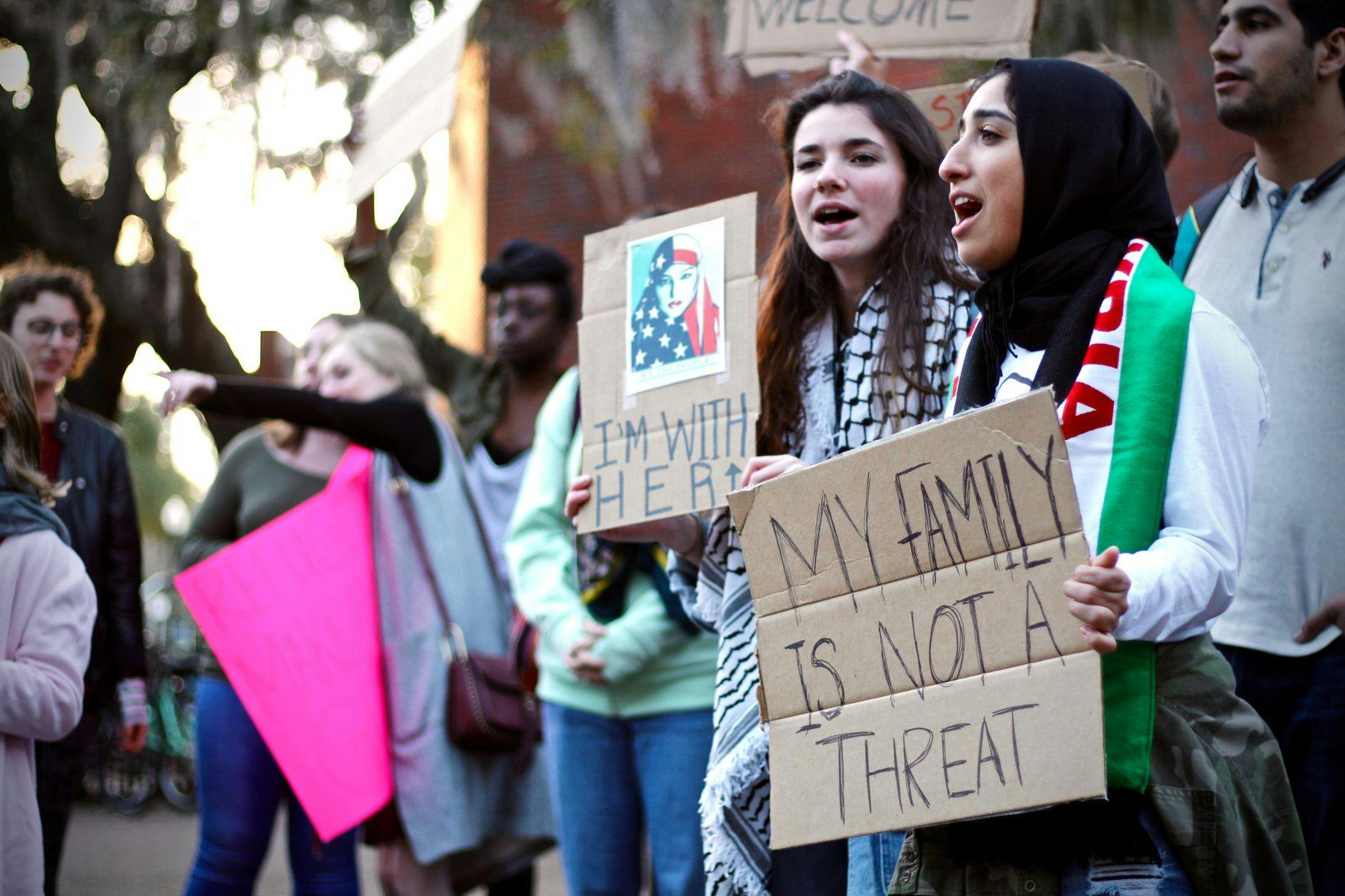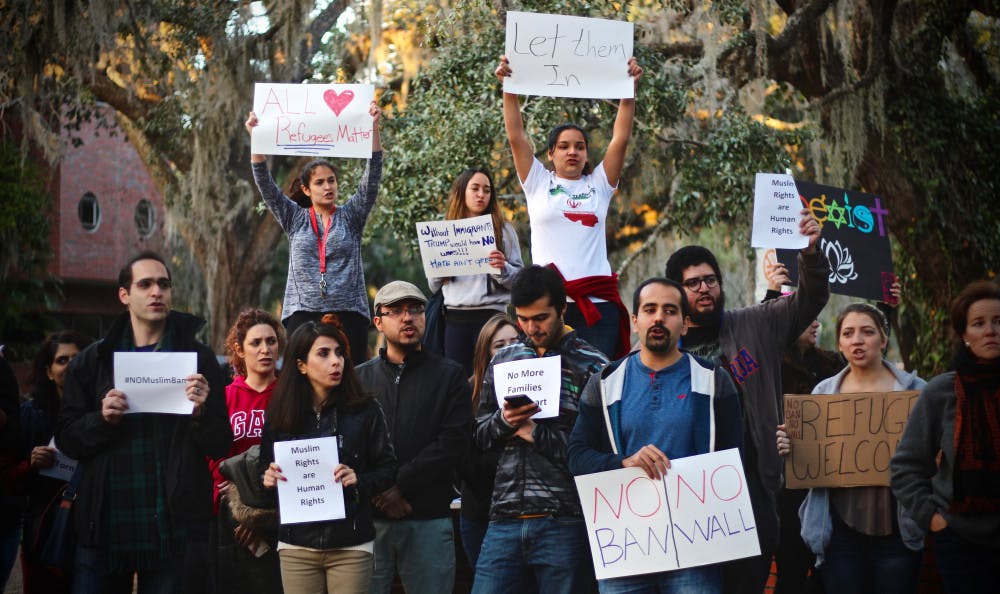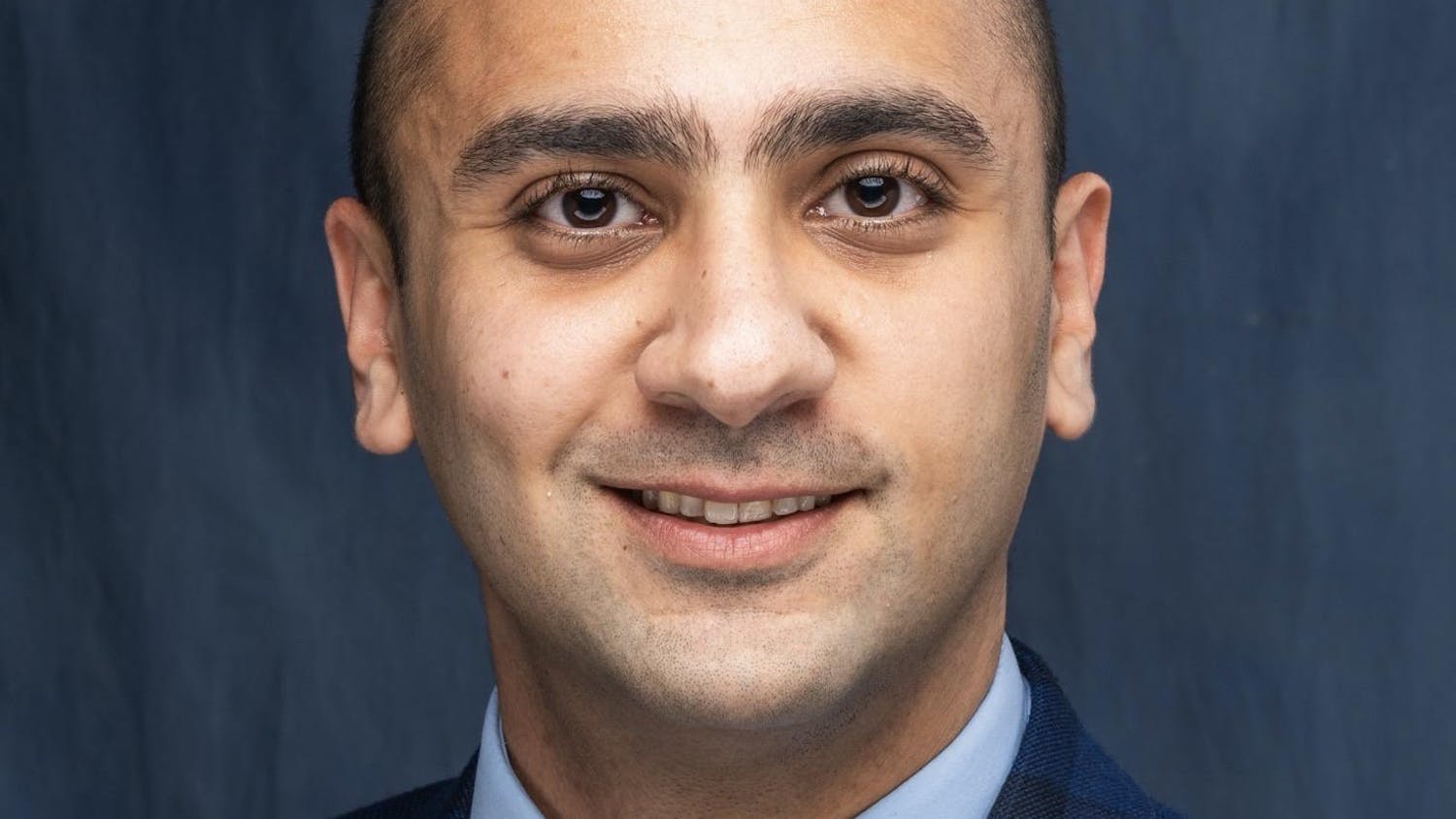Kimia Ghaffari held her hand to her throat Sunday, taking in the protest the Irani immigrant spent two days planning.
With proud tears in her eyes, the 18-year-old UF chemistry freshman watched about 150 people she had brought together on Turlington Plaza speak out against President Donald Trump’s immigration ban.
On Friday, Trump signed an executive order barring people from seven Muslim-majority nations — Iran, Iraq, Syria, Sudan, Libya, Yemen and Somalia — from entering the U.S. for 90 days, the Associated Press reported.
The order also barred the U.S. acceptance of Syrian refugees indefinitely.
It was signed in the name of national security, but over the weekend, people across the country protested what many called a Muslim ban in airports and in the streets, including at UF and in Gainesville.
“People have said that America is the greatest country in the world so many times that they have started to believe that American people are the greatest people in the world,” Ghaffari said. “They’ve started putting the lives of American people over those in need.”
UF President Kent Fuchs released an email Sunday and said of UF’s about 7,000 international students, there are about 200 undergraduate and graduate students, faculty and staff from the seven named countries in the executive order.
“Embracing all members of our community and maintaining a welcoming environment for talented students, faculty and staff from around the world are central to our values and identity as a university,” he said.
Though the Trump administration has claimed the ban is for U.S. safety, Ghaffari said it’s the most offensive thing she’s ever heard.
And though citizens from Saudi Arabia, Egypt and the United Arab Emirates have committed terrorist attacks in the U.S., they weren’t included in the Trump’s ban. Trump and his family also have business interests in the three countries, NPR reported.

Sophia Timm, a 20-year-old UF biology and anthropology junior, stands alongside Rana Al Nahhas, a 21-year-old UF psychology senior, who holds a sign that reads, "My family is not a threat."
Ghaffari called the ban dehumanizing ban and said it would cause a divide between families, friends and countries around the world.
“It’s easy to insult someone as soon as you dehumanize them,” she said. “They don’t think they’re banning people, they’re banning immigrants. It’s not human beings to them — it’s just a word.”
A federal judge ruled Saturday that people who had returned to the U.S. from the affected countries and were being detained in U.S. airports could not be sent back, although the White House said the ruling doesn’t affect the executive order.
When Nikka Vakhtiar, 18, heard of the ban, she was confused.
“It kind of just felt like out of the blue,” the UF biology freshman said. “It’s not like there are any direct threats.”
Her confusion quickly turned to anger as she thought of her family in Iran, who wants to travel to her cousin’s graduation this summer. Vakhtiar left Iran when she was 6 months old. Now she doesn’t know when she’ll see her family again.
“This completely threw us all off,” she said. “I’m kind of scared about it. It feels like it’s just the beginning.”
Susanne Hill, the executive director of the UF International Center, wrote in an email that no students are currently studying in the countries affected by the ban.

Samira Roostaie, a 30-year-old UF art history graduate student, holds a sign that reads, “Muslim Rights are Humans Rights,” while standing in a circle of more than 120 people. "Muslims are welcome here,” the group chanted.
On Sunday, protesters took to the street to share the same message of solidarity. About 15 people stood on the corner of Northwest 34th Street and West University Avenue to protest the ban.
Taylor Spruce, a UF psychology freshman, held a sign reading, “I stand with Muslim immigrants.” The 18-year-old said her boyfriend has family in Iran and can’t travel to his home country without fearing whether he can return.
“This ban affects us all,” she said.
On UF’s campus, about 150 people chanted on Turlington Plaza as they spoke out against the ban. Protesters marched from Turlington along University Avenue to its intersection with Southwest 13th Street.
While cars honked in approval, some spectators screamed in anger at the protestors. Participants shouted, “No hate, no bigotry, no Muslim registry” and “Ban Trump, not Muslims.”
Ghaffari, who organized the protest, said she created the Facebook event Saturday evening to speak out.
“I was tired of being quiet,” she said.
Ghaffari was born in Iran and migrated to the U.S. with her parents when she was 9. Although she’s an atheist, she said she feels like Muslim immigrants aren’t treated fairly.
“There’s this misplaced fear of terrorists when it comes to Muslims,” she said. “We’re still being punished and still being treated as the other, as the enemy, even if we haven’t done anything.”

More than 120 people who gathered on Turlington Plaza march north on Newell Drive on Sunday afternoon while chanting, "Muslims are welcome here."
At the beginning of the protest, Vasudha Narayanan, a UF religion professor, read a statement from President Fuchs addressing the protesters’ concerns. Narayanan said UF spokesperson Janine Sikes asked her to read Fuchs’ letter.
The statement said UF supports its international community and keeps students’ records private.
At about 6:45 p.m., Fuchs walked over to the protest from Tigert Hall, thanking protesters for supporting Muslim students, he wrote in an email.
Rana Al-Nahhas, whose parents are Syrian immigrants, said she was glad Fuchs came to the UF protest.
“He wasn’t there very long but the fact that he showed up meant so much for us,” she said. “I broke down seeing that many people out there to say that I am welcome here, I am safe, they do not accept this intolerance and this hatred and this fear.”
Margaret Clifford, a UF research assistant, wrote in an email that she sent a letter with 50 signatures to Fuchs on Sunday night regarding the ban. The letter asked Fuchs to ensure that UF community members affected by the ban won’t be penalized monetarily, academically or professionally.
“It’s important that we strongly and loudly oppose any legislation or cultural shift toward increased xenophobia,” the 30-year-old said. “The University of Florida is an international community and it is important to me that people, regardless of what passports they carry, feel safe to learn, to live, and to express themselves here.”
By Sunday night, another petition asking Fuchs to condemn Trump’s executive order had gained 3,000 signatures. While UF students band together in protests, letters and petitions, Ghaffari said people should realize Muslims aren’t dangerous.
She said she grew up accustomed to people treating her like a foreign animal, even her classmates in elementary school, but Trump’s ban will make it worse.
“I’m not going to bite you,” she said. “Somehow that elementary school kid became the president.”
Staff writers Catherine Dickson, Meryl Kornfield, Katelyn Newberg and Jimena Tavel contributed to this report.
Behnaz, a 42-year-old UF science management masters student who wanted her last name to remain anonymous, stands with a group of more than 120 people on Turlington Plaza to protest President Donald Trump's muslim ban. "This is not together, this is segregation,” she said.






